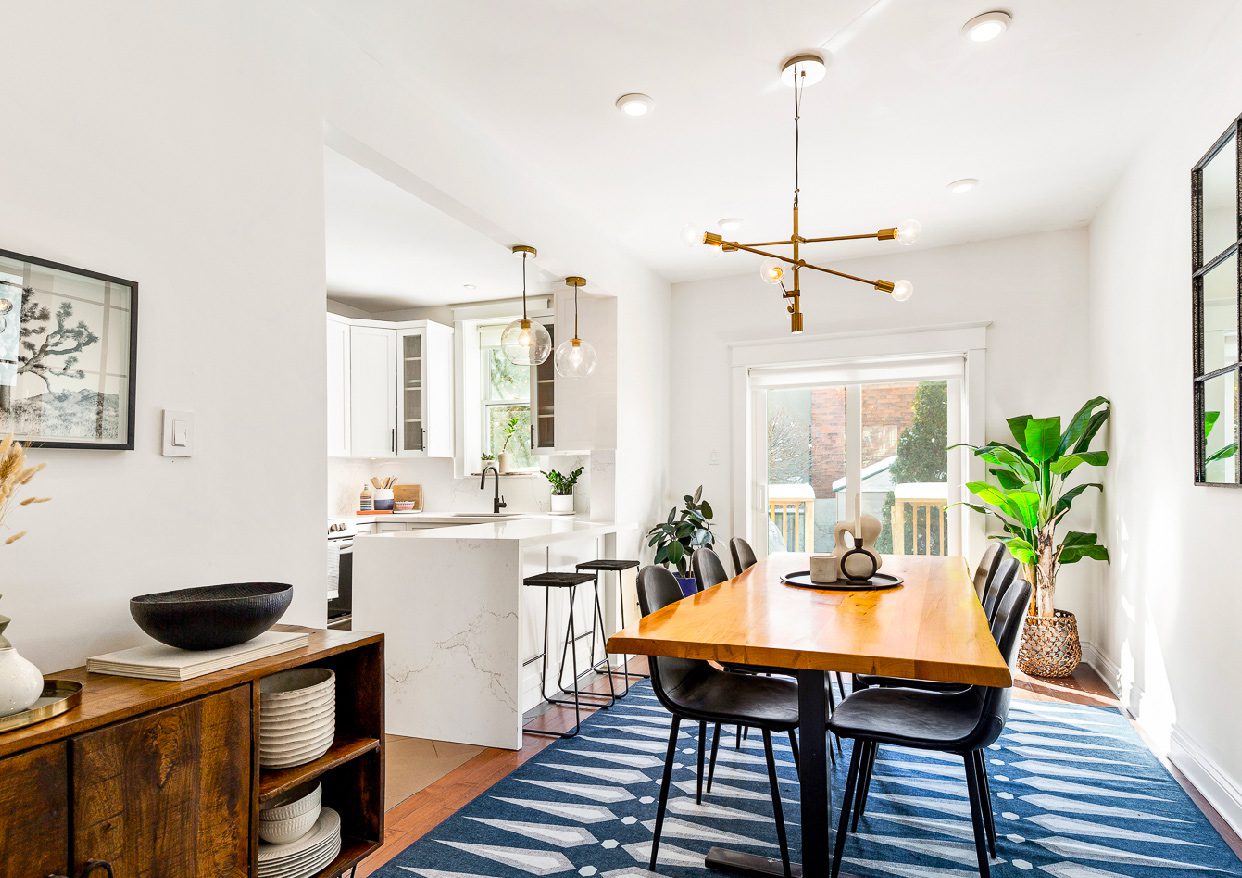January 9, 2024 | Buying
Red Flags to Look For When You’re on the House Hunt!

In your pursuit of the ideal home in Toronto’s west end, it’s not merely about the property itself, but also about the complete package, including the neighbourhood’s atmosphere. Homes in the west end come with a side of charm, character and sometimes a sprinkle of challenges, but with the right info, you’ll be sailing smoothly in the decision making department. In this relaxed guide, we’ll explore warning signs, evaluate renovation standards, decode intricate listing details, and emphasize the crucial task of assessing the neighbourhood. By the time we’re done here, you’ll be armed with everything you need to see the right opportunity and snag your dream home.
What are signs of neglect?
Let’s kick off by talking about first impressions and your initial encounter with your potential new home. While it won’t uncover every secret, it’s a solid starting point. To kick off your exploration, start with the exterior and observe if there are any visible indications of neglect – take a close look at the eavestroughs, fascia, soffits and check if there are any loose handrails or wobbly deck boards. Shift your attention to the windows – are they brand new or telling tales of history? Inspect the state of the brickwork, siding and the visible foundation. Look for indications of decay, exterior cracks, and assess if these could potentially indicate water penetration.
Alright, now that we’re indoors, let’s delve into the details. Notice any water stains on the ceiling? Cracks in the walls giving you a curious look? Keep an eye out for uneven or sagging floors—these visual indicators could signal underlying problems.
Crucial tip: Don’t hesitate to have an open conversation with your real estate agent about the property’s maintenance history and acquiring further into from the seller’s agent. A well-maintained home often equals a contented one. Also, get your hands on the home inspection report – it’s like a throughout exam for your potential abode and may highlight issues that aren’t immediately visible. It’s important to note that home inspectors don’t have x-ray vision and are unable to cut into drywall to see what’s behind the walls. In an older home, this means that unforeseen elements might be concealed behind the walls, like outdated electrical, plumbing systems or mould. Nevertheless, seasoned home inspectors possess the expertise to frequently anticipate potential issues due to their years of experience.
Deal breaker red flags: The following items warrant further investigation or even a pass: major structural issues like prominent foundation cracks, severe settling or noticeable sagging in floors or ceilings, wet water stains and mould. And if your home inspector’s findings don’t align with what you’re seeing, that’s a red flag in itself.
Looking for more valuable advice to make sure you buy the right house in the right neighbourhood? The posts below will help:
- How Long Does It Take To Buy A House In Toronto?
- How to Evaluate a Good Fixer-Upper in Toronto’s West End
- Key Steps to Buying a Home in Toronto
Are the renovations good quality?
Many homes in the west end are nearing the century mark, and a good number of them have been renovated to different extents, with various owners making changes over several decades. Since the building code is always evolving in Toronto, getting your hands on specific details from older renovations can prove to be challenging. Yet, if you come across a home featuring recent renovations that showcase a gleaming new kitchen or a basement resembling a luxurious spa, before you get swept away, take the time to delve deeper and gather essential details about the renovation.
Ask important questions: If the recent renovations go beyond simple cosmetic changes, inquire about the permits pulled for the work, verify their status, and ensure the city has conducted a final inspection for closure. Determine whether professional contractors were involved or if it was a do-it-yourself project. Poorly executed renovations might transform your ideal home into a financial burden in the future.
Open permits can spell trouble during the closing process, even if the renovations were done ages ago. And if there’s a mysterious aura surrounding the renovation details, particularly if there’s been more than one round of upgrades, be prepared to do some investigating.
Deal breaker red flags: “Dodgy flips” is the term used for renovations where the seller purchased a home requiring big updates, completed the renovations themselves or hired trades, with the intention of selling. In a dodgy flip, the craftsmanship is less than stellar or there is often a lack of information surrounding the renovations from the seller. When you notice a lack of precision in the final touches, it’s like seeing the tip of the iceberg – there’s potentially more lurking beneath. In a scenario like this one, further investigation is needed and sometimes a full pass.
Why isn’t this house selling?
It’s time to zoom out from the house itself and focus on the bigger picture – the listing details. Your real estate agent is your partner on this journey, so don’t hold back on asking questions.
Let’s start with the basic info – how long has the property been on the market, and why hasn’t it found a new owner yet? Days on market (DOM) is your scoreboard – it can reveal whether there’s something to look into further. What is the pricing strategy? Is the listing price set strategically lower to attract multiple offers? Or is it priced at the which it’s expected to sell at with offers accepted at any time? Delve into the details of what is keeping this home on the market.
Now, ask your agent to channel their inner detective and gauge the seller’s motivation and willingness to cooperate. Are they eager to sell or adopting a more resistant stance? Have there been any offers made, and if not, what’s causing the delay? Are there any hidden issues, such as a track record of price reductions? A transparent and knowledgeable agent can offer invaluable insights into these aspects.
Occasionally, it’s not the property itself, but rather the seller’s attitude or guidance from their agent that could disrupt the deal, so bear that in consideration.
Deal breaker red flags: In some situations an uncooperative or stubborn seller can be a deal-breaker. It’s not always their fault and sometimes they’re just following the wrong advice from their agent. When everything else checks out with the house, but it’s still not selling, this could be the culprit.
Is neighbourhood vetting important?
YES, your dream home isn’t just about the property, it’s about the entire neighbourhood experience. Let’s explore how to assess the neighbourhood like a pro.
Start with the walk score and neighbourhood conveniences. What’s nearby? Are there convenient amenities, reputable schools, green spaces, and safe streets for your daily life? Is there a community vibe that fits your lifestyle? How convenient is the access to transit and highways for easy daily commutes.
Schools are often a big consideration when choosing what location works for you. Picking the right school district is a bit like choosing the perfect pizza topping—it’s personal. While stats and rankings are useful, they’re just part of the pie. Get out there, walk around the schools at pick up time, talk to the parents and become part of the neighbourhood chatter. When you find the right school, you’re not just finding a place for your kids to learn, you’re finding a community that vibes with your family’s style.
Now, here’s the golden nugget: engage your real estate agent in a conversation about the neighbourhood’s long-term plans. Are there exciting developments on the horizon, like new shopping centers or parks? Also, not all streets in a neighbourhood are created equal. Some might have unique characteristics or quirks that can affect your living experience.
Deal breaker red flags: This is a personal one, but anything about the location that you don’t feel comfortable with could be the deal breaker!
Speaking of neighbourhoods, here are some you might want to consider:
- West End Green Oasis: Why High Park is Perfect for Nature Lovers
- Is Roncesvalles Toronto’s Most Dog Friendly Neighbourhood?
- How to Choose the Right West End Toronto Neighbourhood for You
So, to wrap things up, there are only a handful of things that should genuinely deter you from buying a home in Toronto’s west end. With a solid agent by your side, you’ll cruise through the process and budget your way to the house of your dreams. As you dive into this exciting journey, keep an eye out for those red flags, but also keep your radar open for the amazing opportunities that this vibrant Toronto community has to offer. Your dream home might just be waiting around the corner, eager for your seal of approval. 🏡✨
Are you ready to start the house hunting process in the West End? Reach out to 416-909-1602 or hello@getnested.ca with any questions.

Our West End Expertise
We know West Toronto like the back of our hands. From real estate to restaurants to neighbourhoods, we have the intel you need to know. Learn more about our local expertise here.







